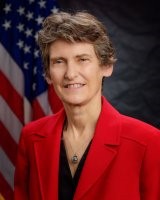June 26, 2022 to June 28, 2022
The HEI Annual Conference 2022 was held June 26-28 at the Westin Washington, DC City Center Hotel. We had an exciting program with innovative and wide-ranging themes such as risks to population health, issues of environmental justice, air pollution and climate change, and cutting-edge research methods. Thank you to all who joined, in person or virtually!
Speaker slides, as well as live stream videos from select poster presentations, are now available.
Recordings of the sessions are available below.
McCabe shared the challenges and opportunities for the EPA and how scientific research has helped inform current and future regulatory decisions.
Watch Keynote
Sessions:
Registration Desk Opens
Jun. 26, 2022 - 10:00am
Welcome and Official Opening
Jun. 26, 2022 - 1:00pmSpeaker: Dan Greenbaum, Health Effects Institute
Setting Ambient Air Quality Standards - What's Science Got To Do With It?
Jun. 26, 2022 - 1:10pm
Watch Session
Chairs: Barbara Hoffmann, University of Düsseldorf, Germany, Kiros T. Berhane, Mailman School of Public Health, Columbia University, USA
The body of evidence on air pollution and health has led to increasingly large risk estimates associated with air pollution in the Global Burden of Disease, and more stringent Air Quality Guidelines from the World Health Organization in 2021. While evidence is increasing, actual adoption of enforceable air quality standards varies for countries and regions around the world, and the resulting standards span a wide range. This session will discuss and contrast air quality standard-setting processes in the United States and Europe, the driving forces in each case, and plans for potential changes to future standards in the context of the new WHO guidelines.
1:10 PM Welcome and Introduction
1:15 PM Setting ambient air quality standards: The approach in Europe and the U.S.
1:25 PM Scientific evidence and decision-making process in the development of the new WHO Air Quality Guidelines
-
,
WHO Regional Office For Europe
1:45 PM U.S. National Ambient Air Quality Standards (NAAQS) Program
-
,
U.S. Environmental Protection Agency
2:05 PM Current efforts underway to revise ambient air quality standards: EU Ambient Air Quality Directives guided by the Zero Pollution Action Plan & European Green Deal
-
,
European Commission, Directorate General Environment
2:25 PM Ensuring that standards protect marginalized populations from disproportionate air pollution exposures
-
Christina Hemphill Fuller
,
2:40 PM Discussion
Announcing the winners of the Jane Warren Award
Jun. 26, 2022 - 3:10pm
Poster Session 1 and Jane Warren Poster Discussion
Jun. 26, 2022 - 4:00pm
Recordings of the Jane Warren Award winners' presentations are available here:
Joyce J.Y. Lin - Characterizing Spatiotemporal Variability in Airborne Heavy Metal Concentration: Changes after 18 Years in Baltimore, MD
Garima Raheja - PM2.5 Sensor Intercomparisons and Regional Trend Assessments from Low-Cost Sensor Networks in Accra, Ghana and Lomé, Togo
Joshua Rivera - Distributed In-situ Measurements of PM2.5 in the Buzzard Point, Washington, D.C. Neighborhood
Ajit Singh - Health and Economic Benefits Attributed to Changes in Air Quality and Traffic Emissions Induced by COVID-19 Emergency measures in Oxford City, UK
Yifan Wang - Disparities in Ambient Nitrogen Dioxide Pollution in the United States
Wenlu Ye - Effects of a liquefied petroleum gas stove intervention on gestational blood pressure: intention-to-treat and exposure-response findings from the Household Air Pollution Intervention Network (HAPIN) trial
Opening Reception and Dinner
Jun. 26, 2022 - 6:00pm
HEI Progress and Future Directions
Jun. 27, 2022 - 8:15am
Watch Session
Watch Keynote
Chairs: David Savitz, Brown University and Chair of HEI Research Committee, and Melissa Perry, George Washington University Milken Institute School of Public Health and Chair of the HEI Review Committee
We will present an overview of current projects at HEI, including HEI’s new literature review on traffic-related air pollution, continuing collaborative research on health effects at low exposure concentrations, new research underway for our core air pollution and energy programs, and updates on our global health program.
8:15 AM Introduction of the Committees
-
,
Brown University, HEI Research Committee Chair
-
Melissa J. Perry
, George Washington University Milken Institute School of Public Health and Chair of HEI Review Committee
8:25 AM Systematic review of selected health effects of long-term exposure to traffic-related air pollution
-
Hanna Boogaard
, Health Effects Institute
8:45 AM Investigating determinants of the magnitude and shape of the associations between long-term PM2.5 exposure and mortality: Harmonized analyses in three large studies in Canada, United States and Europe
9:10 AM Updates on HEI’s Core, Energy, and Global Health programs
-
Ellen K. Mantus
, Health Effects Institute
-
Donna J. Vorhees
, Health Effects Institute
-
Pallavi Pant
, Health Effects Institute
9:40 AM Introduction to Keynote Presentation
9:45 AM Keynote Presentation
-
Janet McCabe
, Deputy Administrator, United States Environmental Protection Agency
Getting from A to B: Emerging Trends in Mobility
Jun. 27, 2022 - 10:30am
Watch Session
Chairs: Gregory Wellenius, Boston University School of Public Health, and Sara D. Adar, University of Michigan School of Public Health
Widespread changes to local and regional patterns in human mobility and goods movement have occurred in recent years. This session will describe changing trends in mobility, including public transportation and active mobility, electrification of motor vehicles, and goods movement. It will broadly discuss new insights and trends, including among others how the COVID pandemic has accelerated or modified some of those trends. The session will also consider long-term effects on air quality and health, as well as associated inequities among specific subpopulations in the United States.
10:30 AM Introduction - A turn in the road? Mobility trends and air quality
-
Gregory Wellenius
, Boston University and HEI Research Committee
10:35 AM How we move: Changing commuting modes and household travel patterns
10:58 AM Are warehouses closing in? New spatial patterns in ecommerce and equity implications
11:21 AM Exploring the role of electric vehicles in future mobility
11:44 AM Planning for a new mobility future
12:07 PM Panel Discussion
Poster Session 2
Jun. 27, 2022 - 1:30pm
Recording of the Rosenblith Award winner presentation is available here:
Lucas Henneman - Air pollution source impacts at fine scales for long-term regulatory accountability and environmental justice
Air Pollution and the Immune System
Jun. 27, 2022 - 3:30pm
Watch Session
Chairs: Ivan Rusyn, Texas A&M University, and Evangelia Samoli, National and Kapodistrian University of Athens
Disruption of the immune system is associated with a range of adverse health outcomes. These may include hypersensitivity, cancer, auto-immune disorders, and increased infection vulnerability and severity. Toxicological and clinical studies suggest air pollution exposure can adversely affect numerous innate and adaptive immune system pathways. Therefore, understanding how air pollution affects immune function is critical to not only understanding the biological mechanism underlying many diseases, but also potential prevention and treatment strategies. This session will highlight research examining immune system responses to ambient and indoor air pollution levels including high exposures from specific sources, such as wildfire smoke or household characteristics and activities.
3:30 PM Welcome and Introduction
-
,
University of Athens, and HEI Research Committee
3:35 PM Acute air pollution and respiratory infection, including COVID-19
3:55 PM Air pollution exposure and altered immune response to respiratory viral infection
4:15 PM Long-term air pollution exposure and immune dysfunction in children
4:35 PM Moderated discussion
Improving Global Public Health through Actions on Energy, Air Quality, and Climate
Jun. 28, 2022 - 8:30am
Watch Session
Chair: Michal Krzyzanowski, Imperial College London, UK, and Kalpana Balakrishnan, Sri Ramachandra Institute of Higher Education and Research, India
Policies addressing energy access and use and improvement of air quality bring both climate and public health benefits. Globally, the use of solid fuels, such as biomass and coal, in the residential sector accounts for nearly 20% of emissions of fine particles and more than 700,000 deaths, with the largest burden in low- and middle-income countries. In addition, the use of wood or pellets, promoted as a renewable and affordable energy source, is becoming an important source of pollution in many cities, especially in high-income countries. This session will bring together a variety of global perspectives on the relationships between household energy, air quality, climate, and health, and will explore pathways used by various regions to address the issues surrounding household energy use.
8:30 AM Welcome and Introduction
-
,
Sri Ramachandra Institute of Higher Education and Research, India
8:40 AM Energy access: Accelerating the adoption of clean cooking, heating and lighting to protect public health
-
,
World Health Organization
9:05 AM Implications of biomass energy use and potential alternatives on climate, air quality, and health
-
,
Stockholm Environmental Institute, USA
9:30 AM Panel Discussion
-
,
Ghana Environmental Protection Agency
-
-
,
International Institute for Applied Systems Analysis, Austria
-
,
Centre for Social Sciences, Hungary
-
,
London School of Tropical Hygiene and Medicine, UK
The “Climate Penalty”: How Heat and Carbon Dioxide Influence Ozone Exposures and Health, Part 1*
Jun. 28, 2022 - 11:15am
Watch Part 1
Watch Part 2
Chairs: Jennifer Peel, Colorado State University, and Jeff Brook, University of Toronto
Climate change produces changes in local temperatures and patterns of cloud cover, biogenic emissions, and large-scale atmospheric circulation patterns. All of these can increase ground-level ozone concentrations in large areas of the United States and elsewhere. This session examines the effects of climate-related changes in ground-level ozone, exposure patterns and their primary drivers, and the resulting risks to human health associated with both acute and long-term exposures. This session also discusses challenges that regulators and policymakers encounter when setting national ozone standards.
11:15 AM Welcome and Introduction
-
Jennifer L. Peel
, Colorado State University and HEI Review Committee
11:20 AM Driving factors and leverage points influencing ozone concentrations
-
,
Massachusettes Institute of Technology
11:47 AM Challenges for regulators and policymakers
-
,
Maryland Department of the Environment
12:15 PM Lunch Break
The “Climate Penalty”: How Heat and Carbon Dioxide Influence Ozone Exposures and Health, Part 2
Jun. 28, 2022 - 1:15pm
1:15 PM Exposure assessment
1:42 PM Health effects of increasing ozone exposure
2:10 PM Concluding Remarks
-
,
University of Toronto and HEI Research Committee
Conference Adjourns
Jun. 28, 2022 - 2:30pm
HEI Code of Conduct
HEI fully expects that all participants who attend any in-person or online meeting or event behave with the utmost respect for peers, colleagues, staff, volunteers, researchers, sponsors, and everyone across the HEI community. It is our sincere desire that every event, meeting, and gathering we host or participate in fosters and encourages an inclusive, positive, and welcoming environment for all. Read HEI’s full Code of Conduct Statement.

